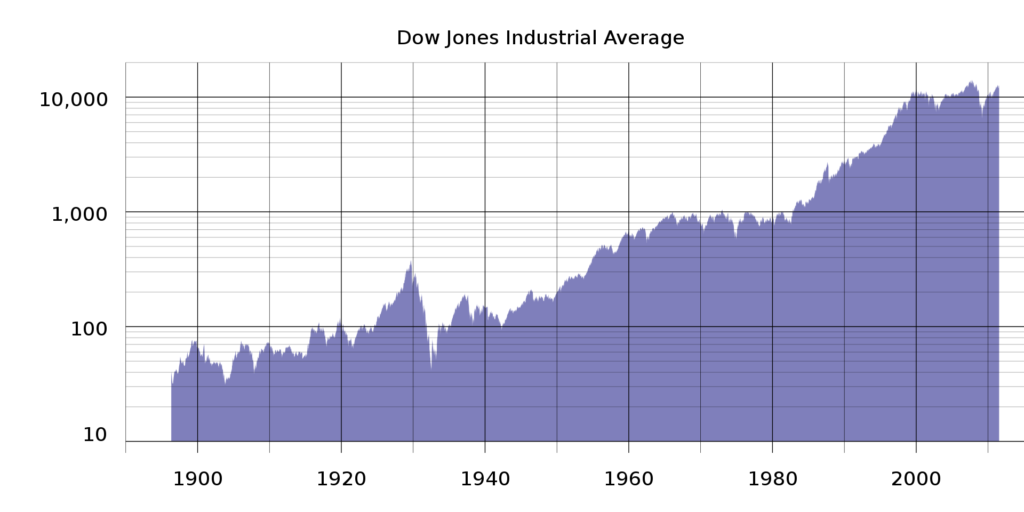
FROM WIKIPEDIA COMMONS
The Dow Jones Industrial Average (DJIA), Dow Jones, or simply the Dow (/ˈdaʊ/), is a price-weighted measurement stock market index of 30 prominent companies listed on stock exchanges in the United States.
Although the DJIA is one of the oldest and the most commonly followed equity indices, many professionals consider the Dow to be an inadequate representation of the overall U.S. stock market compared to broader market indices such as the S&P 500 or Russell 2000 Index. The DJIA includes only 30 large companies and is a price-weighted index, unlike later stock indices which use market capitalization. Furthermore, the DJIA does not use a weighted arithmetic mean.
The value of the index is the sum of the stock prices of the companies included in the index, divided by a factor which is currently (as of November 2021) approximately 0.152. The factor is changed whenever a constituent company undergoes a stock split so that the value of the index is unaffected by the stock split.
First calculated on May 26, 1896, the index is the second-oldest among the U.S. market indices (after the Dow Jones Transportation Average). It was created by Charles Dow, the editor of The Wall Street Journal and the co-founder of Dow Jones & Company, and named after him and his business associate, statistician Edward Jones. The word industrial in the name of the index initially emphasized the heavy industry sector, but over time stocks from many other types of companies have been added to the DJIA.
The index is maintained by S&P Dow Jones Indices, an entity majority-owned by S&P Global. Its components are selected by a committee. The ten components with the largest dividend yields are commonly referred to as the Dogs of the Dow. As with all stock prices, the prices of the constituent stocks and consequently the value of the index itself are affected by the performance of the respective companies as well as macroeconomic factors.
TODAY’S ALMANAC
Question of the Day
How come longitude lines start in Greenwich, England?The Royal Observatory Greenwich is located at the National Maritime Museum in London. The original site of the observatory was arbitrarily chosen as longitude 0 degrees in 1884. A plaque in the original structure marks the zero point from which longitude is calculated. The observatory was founded in 1675 by King Charles II to keep accurate tables of the position of the Moon for the calculation of longitude by English ships. In 1750 those tables were published as the Astronomical Observations, and after 1838 they were published annually. Meridian observations of the Sun, stars, and planets also were made at the observatory. Photographs of the Sun were taken daily, conditions permitting, and a continuous photographic record of sunspots was kept starting in 1873. Today the observatory is primarily a museum with a small planetarium.
Advice of the Day
A dash of salt makes cream and egg whites whip more rapidly.
Home Hint of the Day
If your candles warp, immerse them in a pan of warm water to make them pliable enough for straightening.
Word of the Day
AloofA nautical word, from the old Dutchword loef, meaning to the windward.
Puzzle of the Day
What small animal is turned into a large one by taking away part of its name?Fox (ox)
Died
- Galileo (astronomer) – 1642
- Eli Whitney (inventor) – 1825
- Terry-Thomas (comedian) – 1990
- Dave Thomas (Wendy’s fast food entrepreneur) – 2002
- Alexander Prokhorov (Russian scientist who shared the Nobel Prize in Physics in 1964 for work that led to the development of the laser) – 2002
- Yvonne De Carlo (actress best known as Lily Munster on The Munsters) – 2007
- Iwao Takamoto (cartoonist; created Scooby Doo) – 2007
- Art Clokey (creator of Gumby and Pokey) – 2010
Born
- Jonathan Belcher (Colonial governor and merchant) – 1682
- John Carrol (founded Georgetown University) – 1735
- Alfred Wallace (naturalist) – 1823
- Frank Nelson Doubleday (publisher) – 1862
- Larry Storch (actor) – 1923
- Bill Graham (producer) – 1931
- Elvis Presley (entertainer) – 1935
- Bob Eubanks (game show host) – 1938
- Graham Chapman (actor) – 1941
- Stephen Hawking (physicist) – 1942
- David Bowie (singer) – 1947
- Jeff Francis (baseball player) – 1981
- Gaby Hoffmann (actress) – 1982
Events
- First State of the Union message, delivered by President George Washington– 1790
- President George Washington delivered first State of the Union address– 1790
- The 11th Amendment of the U.S. Constitution, modifying the power of the Supreme Court, was ratified– 1798
- First soup kitchens opened in London for the relief of the poor– 1800
- Lewis and Clark saw a 105-foot-long whale skeleton in NW Oregon– 1806
- Andrew Jackson defeated the British at the Battle of New Orleans (War of 1812)– 1815
- Joseph Lister published the results of his study of antiseptic surgical methods. His use of carbolic acid to sterilize instuments and wounds trebles the survival rate of his patients– 1870
- President Wilson delivered his Fourteen Points speech, suggesting the creation of a League of Nations– 1918
- The Dow Jones industrial stock average passed the 2,000 mark– 1987
- In Singapore, a barge accidentally rammed Jacques Cousteau’s Calypso, causing it to sink in the harbor (it was later raised)– 1996
Weather
- New York City stayed below zero degrees F all day– 1859
- Record cold hit Nevada, -50 degrees F at San Jacinto– 1937
- Operation Recuperation began after ice storm hit New Brunswick, Ontario, and Quebec– 1998
- 15,000+ troops began aid during a multiday ice storm in Ontario and Quebec.– 1998
COURTESY www.almanac.com
